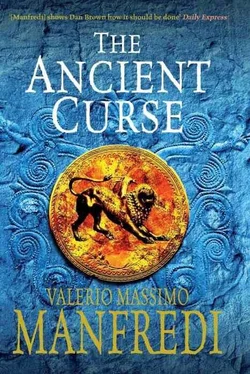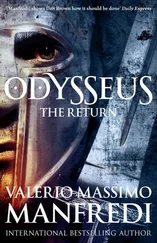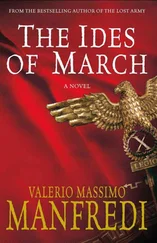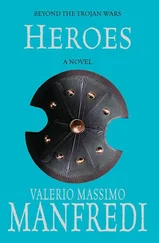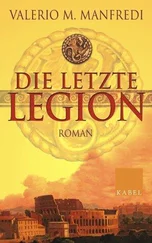
Valerio Massimo Manfredi
The Ancient Curse
Translated from the Italian by Christine Feddersen-Manfredi
Copyright © Valerio Massimo Manfredi, 2001
Translation copyright © Macmillan 2010
FABRIZIO CASTELLANI arrived in Volterra one October evening in his Fiat Punto, with a couple of suitcases and the hopes of securing a researcher’s position at the University of Siena. A friend of his father’s had found him cheap accommodation on a farm in Val d’Era, not far from the city. The farmhouse had been vacant since earlier that year, when the previous tenant had left, having given up on the owner’s grand but sketchy plans to restructure the building and sell it to one of those Englishmen so enamoured of Tuscany.
The house had been added to in various stages over time around a core dating back to the thirteenth century. The oldest part was of stone, covered with ancient handmade roof tiles lichen-stained yellow and green on the north side, while the newer part was in brick. There was a pretty courtyard at the back, a tool shed and a hayloft. The land to the south hosted a dozen rows of big gnarled olive trees laden with fruit, as well as low vines still hanging with clusters of violet grapes and leaves that had started to turn bright red. The drystone wall that skirted the property was crumbling and needed fixing. Beyond the wall stretched a wood of oak trees that covered the hill all the way to its peak in a brilliant sweep of ochre, interrupted here and there by the red and gold of the mountain maples. An ancient box tree stood at the front entrance and a couple of cypresses, taller than the house’s roof, swayed on the other side.
A sparkling brook gushed from a spring close by, flowing over the clean gravel until it disappeared into the ditch at the roadside, only to re-emerge further downstream before descending to the Era. A thick blanket of vegetation hid the river itself, but its voice could be heard mixing with the rustling of the oaks and poplars.
He liked the house instantly, especially the scent of hay, mint and sage that rose through the evening air to meet the flight of the last swallows of the season, still reluctant to abandon their empty nests. Fabrizio set his suitcases down at the threshold and decided to stretch his legs on the pathway that crossed the property from one end to another, dividing it into two nearly equal parts. Then he sat on the stone wall and took in that twilight moment of peace and serenity, suspended in time, a little unreal, as he idly waited for night to fall.
Fabrizio was thirty-three but he still couldn’t count on a steady position, like so many of his friends and colleagues who had embraced the science of the past with a passion, not realizing how difficult it would be to make a living out of archaeology in a country with 3,000 years of history. And yet he was neither discouraged nor demoralized. All he could think of, actually, was that he might soon be encountering the object of his most recent enthusiasm and interest: the statue of a young boy housed in the Etruscan museum at Volterra.
A great poet had given the statue a haunting, evocative name: the ‘shade of twilight’. Right, poets can dream, mused Fabrizio, but not scholars. Time to get down to work. He shook himself out of his reverie and walked back towards the house that he would be calling home, at least for a couple of weeks. Long enough to finish his research and to gather the information and materials necessary for a publication that might, with luck, even cause a bit of a stir in the field.
His interest in the piece had come about totally by chance. He’d been in Florence at the National Restoration Institute, studying the most recent techniques in treating and conserving ancient bronze, when he’d happened upon a set of X-rays of the Etruscan statue, perhaps taken in view of a possible restoration. The X-rays had been stuck into a file at the bottom of a drawer and would have remained there who knows how long, waiting perhaps for financing from some ministerial project. Fabrizio had been struck by a strangely shaped shadow that showed up in the plates right where the boy’s liver would have been. From a certain angle, the shadow took on the shape of a longish, pointed object.
He hadn’t breathed a word about his discovery to anyone. There was no mention of the shadow in any file or description of that unnamed masterpiece of Etruscan art. He’d had copies made of the X-rays and had scanned them on to a couple of files that he could analyse on the computer. But the more he looked at them, the more Fabrizio became convinced that he needed to examine the object itself to get to the root of the mystery, and he had requested permission to analyse the statue itself. He figured that a move to Volterra would make it easier to carry out his research on an intensive basis. What he really wanted to do was an MRI; the results would certainly complete the overall picture and provide the key for explaining the irregularity in the bronze cast.
He’d examined the hypothesis of a flaw in the bronze fusion or a defective weld, but neither made much sense since the area of the statue he was interested in was made of flat, relatively regular surfaces where the liquefied metal would have been free to flow smoothly when the statue was being cast some twenty-four centuries ago.
As he was driving in earlier, he’d stopped at a grocery shop to buy bread, cheese, prosciutto and a flask of Chianti. He went into the big kitchen and sat at a table shiny with centuries of use, opening a book by Jacques Heurgon on Etruscan civilization for company as he enjoyed his makeshift dinner. He’d made up the bed with clean sheets he had brought from home and around midnight he lay down in a room that smelt of fresh plaster, stared up at the ceiling beams and listened to the song of a nightingale rising from the locust trees and laburnums that flanked the little brook.
Elisa, his fiancée, had left him three months before and he hadn’t quite got over it. A classic tale of woe, really. A bit spoiled, Elisa, and lacking the guts to defend her relationship with a good guy like himself – agreeable and attractive, with a solid background and a promising future, or so he liked to think – against her wealthy, stuck-up parents’ protests that he didn’t have much in the way of job prospects; that he didn’t dress with much class. He was bitter about the break-up, that much he would admit, mostly about how he’d deceived himself into thinking that he was up to their standards, to anyone’s standards. He had felt so humiliated by her rejection, their rejection, that he hadn’t made love to anyone since Elisa had left. Basically, his psychological well-being had been shot to hell. But now that he’d left the city and found himself in such a different atmosphere, so intensely pervaded by simplicity and austerity, he was beginning to feel at peace with himself. He felt rather like an athlete gearing up for a crucial meet.
He wondered whether this fortuitous state of grace would hold up in the medium and long run, or whether such isolation would shortly produce the opposite effect, driving him to flick through his address book in search of the mobile number of a tender-hearted female friend. In the end, the emotion of finding this haven and of being on the threshold of what he hoped would be an important discovery, plus the snug warmth of his bed, won out over his agonizing.
THE NEXT MORNING he introduced himself to Nicola Balestra, the regional director of NAS, the National Antiquities Service, who, it turned out, had just arrived himself a couple of weeks earlier, temporarily abandoning his main office in Florence but leaving his secretary behind to transfer important calls and forward urgent papers. Balestra had a dry, taciturn manner, and was famous for being disagreeable to the university crowd and keeping them at arm’s length, especially those – wagging tongues would have it – who prided themselves on being talkshow darlings.
Читать дальше
